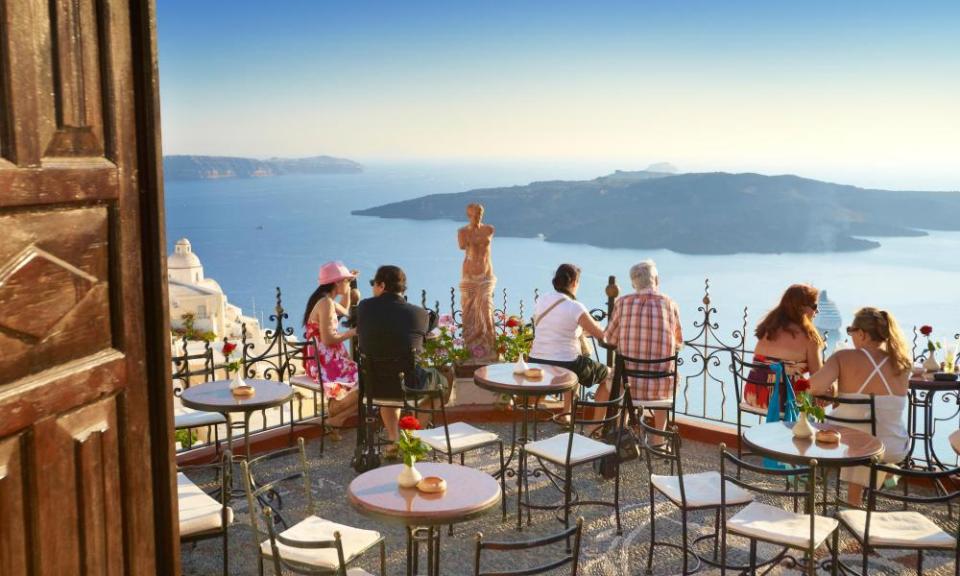Europe clamps down amid fears over rapid spread of Delta variant

With the school term finally over, Britons are flying to Europe in their tens of thousands, record levels for this Covid year. They are arriving in countries where the Delta variant paralysing Britain is just becoming dominant – and Europe is responding by clamping down.
Some countries have tightened border controls, with Malta barring entry to unvaccinated travellers and Germany bringing in stricter quarantine rules for people arriving from Spain and the Netherlands. More broadly, authorities from Greece to Italy and France to Portugal are bringing in what are effectively vaccine passports for a wide range of activities, although most are shying away from using that term, which has become incendiary.
Italy will require proof of vaccination – through the Europe-wide “green pass” – to do anything from visiting a museum, to working out at a gym or watching a film. Similar rules in France have sparked two weekends of headline-grabbing protests attended by tens of thousands, including far-right activists on Saturday. But most French adults are fully vaccinated now and polls show a majority support the new measures.
In Greece, bars and restaurants can now only welcome vaccinated customers inside, a curb that Portugal introduced at the start of July.
The WHO said on Friday that the Delta variant has now become dominant in much of Europe. And politicians have cited the rapid rise of this highly transmissible form of Covid to justify moves restricting much of public life to the vaccinated. “The Delta variant is even more of a threat than the other variants,” Italy’s prime minister, Mario Draghi, told reporters. “The green pass is not arbitrary, but a necessary condition not to shut down the economy. Without vaccinations, everything will have to close again.”
The head of the European Central Bank, Christine Lagarde, warned of the specific risks caused by Delta as the bank voted to keep its vast Covid stimulus programme in place last week. “The reopening of large parts of the economy is supporting a vigorous bounce-back in the services sector. But the Delta variant of the coronavirus could dampen this recovery in services especially, in tourism and hospitality,” she said.

Current data shows that the Delta variant is about 60% more transmissible than the Alpha variant, which in turn is 60% more transmissible than the original variant from China, according to Martin Hibberd, professor of emerging infectious disease at the London School of Hygiene and Tropical Medicine.
So 10 people infected with the original Covid strain would pass the disease to about 25 other people, without restrictions such as lockdown or vaccinations. But 10 people infected with the Delta variant will make between 60 and 70 people ill.
Scientists say Europe is now facing the same race between vaccination and the Delta variant that has been under way in the UK for several months. “Clearly the UK is doing well with getting the vulnerable groups like the over-50s vaccinated, and yet we’re still seeing more hospitalisations than the NHS would like at the moment, so it’s going to be tricky for Europe. And I think the answer is to do more vaccinations,” said Hibberd.
“Europe probably needs to expand [mass testing] a little bit more so that people can be more aware about whether they’re positive or not and then isolate if they are. [Europe] haven’t been quite as good at that: you can’t get free tests quite as easily across Europe as you can in the UK.”
There is mounting anecdotal evidence that requiring vaccines at schools, work, and leisure venues can spur people to get their jabs. In the week after Emmanuel Macron, the French president, announced tighter controls on 12 July, a record 3.7 million French citizens signed up for a vaccination, Reuters reports.
In Italy, Draghi’s decision also prompted a pickup in vaccine bookings, officials said. “I think the prime minister has achieved what he wanted to achieve,” said Giovanni Toti, president of the region of Liguria.
Overall, more than half of the EU’s population has now been fully vaccinated, but there are significant differences between countries. And the fast rise in cases can even put the fully vaccinated at risk.
“Sadly in many countries in our region we’re seeing a significant rise in cases associated with the spread of the highly transmissible Delta variant,” said Hans Henri P Kluge, the WHO’s regional director for Europe. “Despite tremendous efforts by member states to vaccinate people across the region, millions more remain unvaccinated and therefore at risk of ending up in hospital.”
The bleak example of Britain’s summer wave of infections may have pushed European politicians to bring in tighter controls, showing them what could lie ahead if they don’t act.
“Aside from vaccine rates, I’d say the way the UK has handled Delta is precisely the opposite of how it should be done,” said Stephen Griffin, associate professor in the school of medicine at the University of Leeds.
“Allowing mass infection alongside partial vaccination is not only causing avoidable illness and death, including under-18s, it will cause profound morbidity from long Covid and represents a huge experiment in virus evolution that could generate more dangerous variants.”
Europe, he noted, is at least protecting children over 12 by rolling out vaccines. The UK is still restricting eligibility to over-18s, even though mixing at schools appeared to be fuelling some of the increase in cases.
The UK’s high levels of Delta variant mean British tourists are banned from European countries including the Netherlands and Bulgaria. But summer holiday hotspots across the south of the continent that rely on tourism for a significant slice of their GDP are still encouraging travellers from the UK. EasyJet said this would be its busiest weekend of the year so far, carrying over 135,000 passengers to locations across Europe. That may well fuel an even faster spread of the dangerous variant.
“The UK was responsible for exporting Alpha, and now Delta. Countries across Europe, especially the UK, still haven’t learned the value of regulated quarantine,” said Griffin. Control measures including green pass rules “will all help”, he said. “But to control Delta properly you should ideally use both vaccination and restrictions in a concerted effort – unlike the UK.”

 Yahoo Movies
Yahoo Movies 
